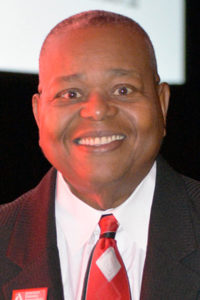[mom_video type=”youtube” id=”TyAzj_LLbxM”]
[gap]

Improving the lives of people with diabetes takes equal parts of dedication and hard work, according to Otis W. Kirksey, PharmD, RPh, CDCES, BC-ADM, ADA President, Health Care & Education. That’s why we’re all here, he said.
“Knowing your ‘why’ gives you a competitive advantage. If you are working from ‘why,’ you are working with great passion and focus,” said Dr. Kirksey, who discussed his personal journey in diabetes care on Saturday, June 4, during his presidential address No Substitute for Hard Work: Dedication to the Diabetes Community. The session was livestreamed and can be viewed on-demand by registered meeting attendees at ADA2022.org. If you haven’t registered for the 82nd Scientific Sessions, register today to access the valuable meeting content.
Dr. Kirksey asked the audience—both onsite in New Orleans and online around the world—if they knew their ‘why.’ Why are you part of the diabetes community? Why are you focused on helping people with diabetes to improve their lives?
“I learned my why several years ago—why I am here in this place, at this very moment,” he said. “I am here because of my village, the people that shaped my life.”
One of the early lessons from his village was that equity and diversity are both powerful and necessary, he said.
“My time at Florida A&M University pharmacy school revealed the disparities in health care and gave me a passion to address those disparities through compassion and commitment,” Dr. Kirksey said. “And through my time with Neighborhood Medical Center (NMC), a Federally Qualified Health Center, diabetes became personal.”
NMC is a full-service medical center providing primary care, chronic disease management, mental health services, dental care, and a variety of specialty services, including OB/GYN, orthopedics, pediatrics, and psychiatry.
“And [NMC] provides the glue that holds it all together, case management,” Dr. Kirksey said. “Many of our patients struggle daily with the cost of medication and supplies, even those who have insurance. And several of our neighborhoods have been identified as food deserts.”
Social determinants of health are an everyday reality at NMC, where the prevalence of diabetes is 18%, far higher than the national rate of 11.3%. Not surprisingly, diabetes management and education are a key priority at NMC.
“We use the chronic care model for our patients with diabetes, a pharmacist-led multidisciplinary team that focuses on person-centered care for diabetes and its co-morbidities, with collaborative goal-setting—and it works,” Dr. Kirksey said.
A random retrospective chart review of NMC patients with diabetes found a mean baseline A1C of 9.61, and 52% of patients had an initial A1C greater than 9. Six months later, the mean A1C had fallen 1.83.
“We are excited by how far we have come, and we must understand there is a tremendous workload that we still face,” Dr. Kirksey said. “We all know that marginalized communities fare far worse in the inferno of health care disparities. We must embrace the reality that these health care inequities exist and that it’s our task, our passion, to make a difference.”
The ADA is making progress in that direction with the Health Equity Now campaign and the Health Equity Bill of Rights, advancing programs and legislation to make insulin more affordable, and launching the nation’s first insulin-specific patient assistance program in early 2022, Dr. Kirksey noted.
“Our available funds were fully distributed in just 13 days,” he reported. “We continue to seek support so we can reopen this program. There are 13 million people with diabetes in this country who qualify for financial assistance.”
The ADA is also focusing on extending and expanding diabetes care and education services. Nationwide, there is just one diabetes care and education specialist for every 16,000 people with diabetes.
“The Health Equity Bill of Rights envisions a future without health disparities,” Dr. Kirksey said. “From the right to affordable access to insulin and other medications to having your voice heard, our why is to ensure the most basic of all human rights—the right to health.”
[sub-post-content]

